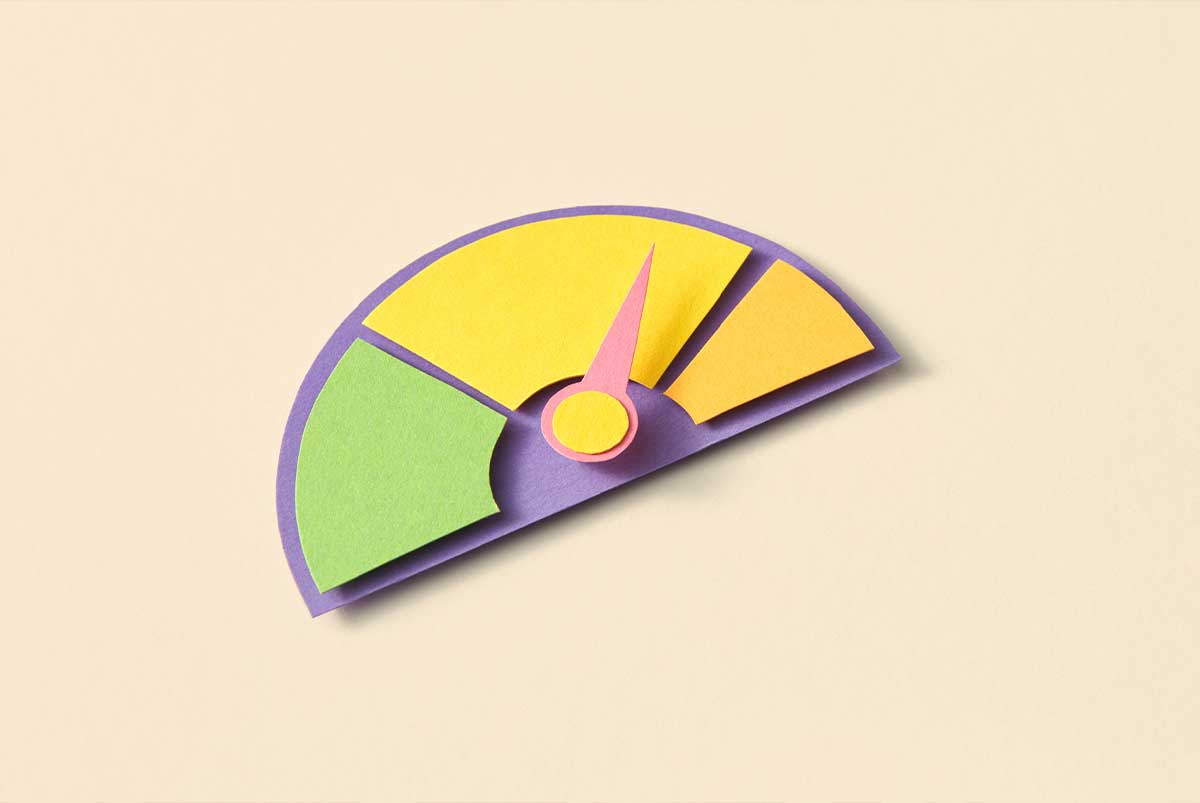Ready To Buy a Home?
Get Approved to Buy a Home
Rocket Mortgage® lets you get to house hunting sooner.
Refinancing your home is a process that enables you to modify and replace your current mortgage with better terms. There are many different reasons why people choose to refinance, such as lowering their interest rate or changing the structure of the mortgage.
Refinancing isn’t something that happens automatically. In order to refinance, you’ll need to get approved, just as you did when you applied for your current mortgage. And as you’d probably expect, your mortgage lender will look at several different variables when you’re refinancing, including your credit score.
If your credit score has significantly dropped since you first bought your home, you might be wondering if refinancing is an option. In general, you’ll still be able to refinance your home with a lower credit score, but there are a lot of important caveats that you’ll want to keep in mind.
Let’s take a closer look.
Can You Refinance a Mortgage With Bad Credit?
In most cases, people with bad credit scores will be able to refinance their mortgage. In fact, even if your credit score is below 620 – what many lenders consider to be the cut-off for poor credit – you’ll still have several available options.[1] Refinancing policies vary by lender, which is why it’s a good idea to compare multiple options before making a final decision.
However, just because you find a few cooperative lenders doesn’t mean your credit score is something you should ignore. If your credit score is too low, your refinancing options will be limited. Additionally, you might be asked to pay a higher interest rate, which could make refinancing no longer worth it.
Lenders will likely look at why your credit score is currently low. There are many variables that go into your credit score, including the length of your credit history, your credit mix and your ability to make payments on time. If you’ve recently taken out a lot of credit and missed payments, refinancing will be much harder. But for example, if your score is low because you were late on a few mortgage payments several years ago, but you’re currently caught up, your lender might be more forgiving.
Keeping these things in mind, you shouldn’t let low credit deter you from investigating your options. If you can find a lender with the right conditions, then refinancing can be very beneficial.
How To Refinance With Bad Credit
If your credit score is currently 620 or below, you’ll need to be willing to do a bit more work to get refinanced. When doing so, be sure to keep these strategies in mind.
Talk to your current lender
If you have a good relationship with your current lender, they’re probably who you should turn to first when considering refinancing. After all, since you already have a mortgage with them, it will be in both of your best interests to establish a mortgage agreement you can actually afford.
If you’ve been making payments on time (preferably for at least the past 6 months), your lender might be willing to overlook some imperfections in your credit score. Additionally, your lender might be able to help raise your credit score by removing a late payment mark on your report – it certainly never hurts to ask.
Work with a mortgage broker
Working with a mortgage broker will connect you with a wide network of possible lenders. This includes mortgage lenders who have generally forgiving refinancing requirements or programs to help lend to people with lower scores. Your mortgage broker has likely worked with people in similar situations before and will be able to point you in the right direction.
Find a non-occupying co-client
A non-occupying co-client is a type of co-signer who has a shared financial interest in your home but doesn’t physically live with you. In the event that you default on your mortgage (stop making payments), the co-client could be held responsible – so be sure to keep making your payments.
Ideally, this person will have a higher credit score, which can help make your refinancing application more appealing to lenders. However, lenders will still take your credit score into consideration, meaning a co-client isn’t always the perfect solution.
Ask about portfolio loans
A portfolio loan is an “exclusive deal” between a borrower and lender that doesn’t necessarily follow the same structure as a traditional mortgage. Instead, these loans are modified to address a specific financial situation, such as a borrower with a credit score below 620. Portfolio loans can be beneficial in certain situations, though you’ll likely be asked to pay a higher interest rate.
Use an FHA, VA or USDA refinance option
Refinancing your mortgage doesn’t have to happen solely through a private lender. There are several government-backed refinancing options available, some of which are ideal for people with less than perfect credit.
FHA streamline refinance
A Federal Housing Administration (FHA) streamline refinance is one of the most efficient ways to refinance your mortgage. And best of all, as long as you’re at least 6 months into your mortgage, you can find FHA streamline finance options that don’t require a credit check or employment verification.
FHA rate-and-term refinance
A rate-and-term refinance, also known as a no cash-out refinance, is a simple type of refinancing that can be used to modify your current interest rate. While this option does require a credit check, the qualification process is relatively easy.
FHA cash-out refinance
A cash-out refinance, which can also be backed by the FHA, helps you tap into the equity you already have in your home. The cash you receive can be used for home repairs, to consolidate credit or otherwise improve your current financial situation.
VA IRRRL refinance
If you’re a veteran who already has a Department of Veterans Affairs (VA) loan, a VA IRRRL refinance might be able to help you lower your interest rate. To qualify, you need to be current on your existing mortgage and be able to prove refinancing creates a financial benefit.
USDA streamlined refinance
The U.S. Department of Agriculture (USDA) streamlined refinance is a simplified refinancing option for people who own qualifying properties – usually in rural areas. Like the FHA streamline refinance, this option doesn’t require a credit check.
Should You Refinance Your Mortgage if You Have Bad Credit?
By now, you can see that refinancing a mortgage is usually an option for people with bad credit. However, just because you can refinance doesn’t always mean you should. Refinancing can cost a few thousand dollars, so you’ll want to consider all pros and cons before deciding whether or not to refinance.
PROS Pros of Refinancing With Bad Credit👍
Refinancing to lower your interest rate can potentially save you tens of thousands of dollars over the life of your mortgage. In general, interest rates will depend more on trends in the market than your personal credit score.
By refinancing, you can change the term length attached to your mortgage. Switching to a 30-year mortgage will help lower your monthly payment, while switching to a 15-year mortgage will help minimize the amount you pay in interest.
Refinancing can also help you switch from an adjustable-rate mortgage (ARM) to a fixed-rate mortgage. This switch will help you lock in your mortgage payment, regardless of what happens in the market.
If you made less than a 20% down payment when buying your home, you may have been required to get private mortgage insurance, commonly known as PMI. Once your equity share increases to 20%, you can ditch the insurance, which can potentially help you save more than $100 each month.
Another reason for refinancing is tapping into your home’s equity. With a cash-out refinance, you can immediately access cash and use it to improve other aspects of your credit profile.
CONS Cons of Refinancing With Bad Credit👎
Applying for a refinance will usually create a “hard inquiry” on your credit report, which can cause your score to drop by a few points. However, these drops are usually pretty small and can eventually be reversed.
Refinancing isn’t free, and you should only refinance if you believe it’ll be worth it. You’ll need to pay the closing costs associated with the refinance, which will usually be a few thousand dollars – although this will depend on the total value of the mortgage.
Sometimes, when people are refinancing, they’ll find out their home is worth less than they originally assumed. This could prevent you from being able to drop PMI or tap into the amount of equity you were hoping to utilize.
Increase your credit score before you refinance your mortgage
Though it’s possible to refinance with a low credit score, having a higher credit score helps. So if there are any actions you can take to quickly boost your score, you should do them before refinancing.
There are a few ways you might be able to improve your credit score. These include paying off existing debt, consolidating debt, closing out collections and diversifying your credit profile. Depending on your current finances, you might be able to improve your score in a short amount of time.
You Have Options for Refinancing
People with bad credit often assume they’ll be excluded from the broader borrowing market – but this is rarely true. Even if your credit score is bad, you’ll likely still be able to access many different types of refinancing. By doing your research, exploring your options and taking advantage of available resources, you can improve your current mortgage terms and potentially access the equity in your home.
Take the first step toward buying a home.
Get approved. See what you qualify for. Start house hunting.
The Short Version
- In most cases, people with bad credit scores will be able to refinance their mortgage
- In order to refinance, you’ll need to get approved, just as you did when you applied for your current mortgage
- If you have a good relationship with your current lender, they’re who you should turn to first when considering refinancing
Consumer Financial Protection Bureau. “HOW TO DEAL WITH “BAD CREDIT”—OR NO CREDIT—WHEN YOU WANT TO BUY A HOME” Retrieved November 2022 from https://www.consumerfinance.gov/about-us/blog/bad-credit-or-no-credit-when-you-want-buy-home/




